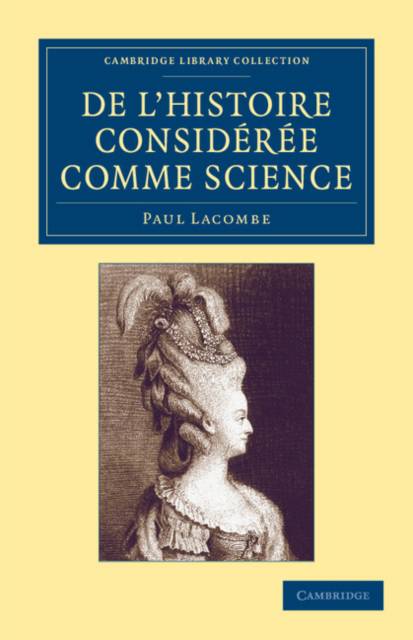
- Afhalen na 1 uur in een winkel met voorraad
- Gratis thuislevering in België vanaf € 30
- Ruim aanbod met 7 miljoen producten
- Afhalen na 1 uur in een winkel met voorraad
- Gratis thuislevering in België vanaf € 30
- Ruim aanbod met 7 miljoen producten
Zoeken
Omschrijving
Paul Lacombe (1834-1919) had a varied career as a historian, senior official and general inspector of libraries and archives. He was one of the most brilliant minds of his day: in 1859 he graduated as first in his class from the elite École Nationale des Chartes, and he was made Chevalier de la Légion d'Honneur in 1887. In 1894, Lacombe published this groundbreaking work, which put him at the heart of the debate about l'histoire science - history served by scientific inquiry - at a time of intense controversy among historians and sociologists. Lacombe insisted on the need for the historian to make strict selections of evidence and to establish a hierarchy among facts. He also laid the foundations of a history which brings social and economic factors to the forefront of investigation. The book remains important and relevant to historians, sociologists and ethnologists.
Specificaties
Betrokkenen
- Auteur(s):
- Uitgeverij:
Inhoud
- Aantal bladzijden:
- 434
- Taal:
- Frans
- Reeks:
Eigenschappen
- Productcode (EAN):
- 9781108054652
- Verschijningsdatum:
- 4/07/2013
- Uitvoering:
- Paperback
- Formaat:
- Trade paperback (VS)
- Afmetingen:
- 140 mm x 216 mm
- Gewicht:
- 548 g

Alleen bij Standaard Boekhandel
+ 173 punten op je klantenkaart van Standaard Boekhandel
Beoordelingen
We publiceren alleen reviews die voldoen aan de voorwaarden voor reviews. Bekijk onze voorwaarden voor reviews.











